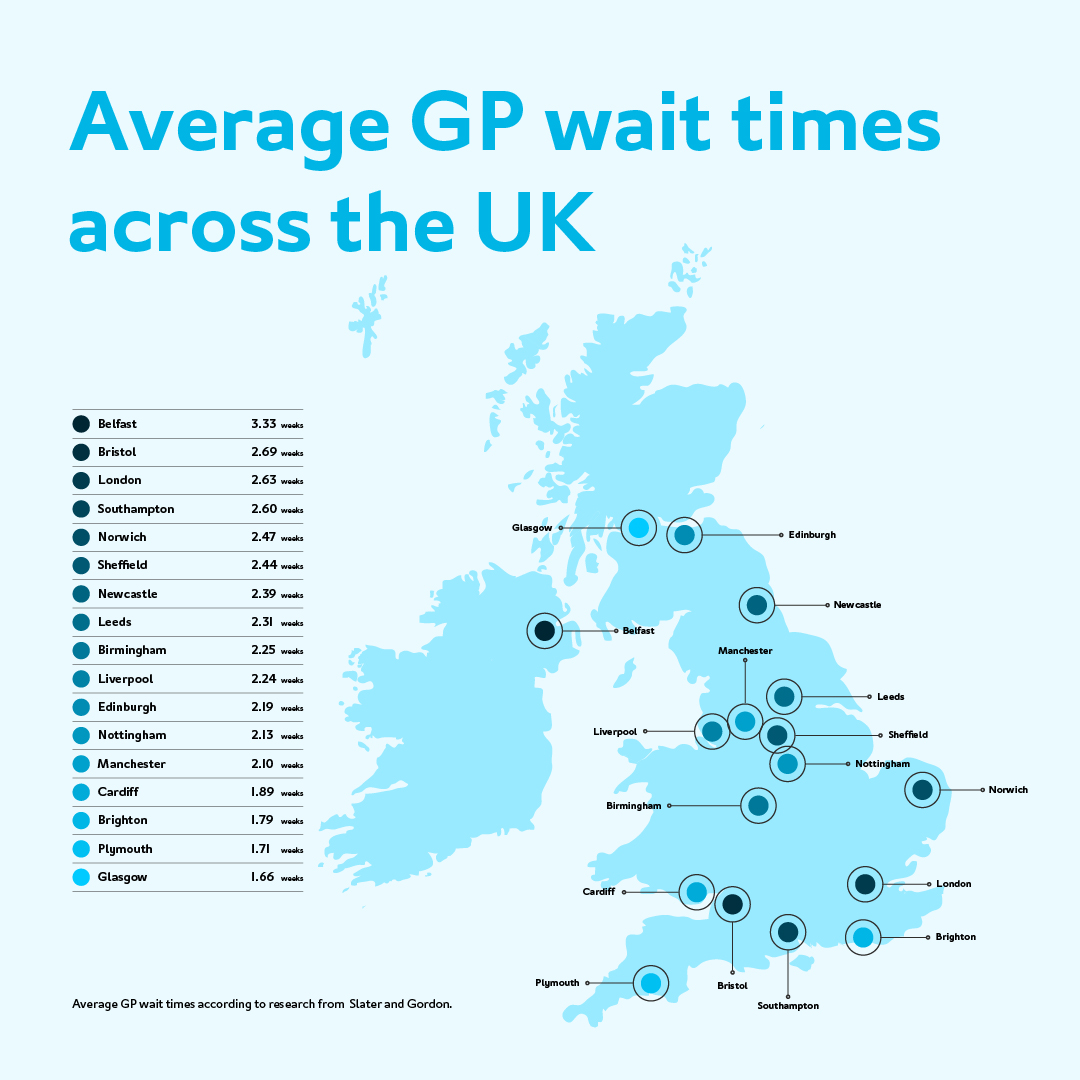Often, incidents of medical negligence occur, even if patients flag problems to their doctor. You may not feel able to advocate for yourself, so we want to empower people that haven’t felt listened to by providing resources allowing you to be your own advocate.

Medical Negligence
The impact of long GP wait times and how to advocate for your health
Securing a GP appointment can be incredibly difficult and can lead to detrimental health outcomes. With our research and help, see how you can advocate for your health.
How hard is it to secure GP appointments in the UK?
With the rise of online booking systems, virtual appointments, and a backlog of post-pandemic patients, securing a face-to-face appointment with your GP has become more challenging than ever.
At Slater and Gordon, we recently conducted research and found that, shockingly, the average wait time to see a GP in the UK is nearly two and half weeks. The findings shed light on the growing frustration among patients, with a significant percentage, 1 in 5 people, have considered leaving the NHS in favour of private healthcare due to long wait times.
The study highlights the impact of extended wait times on those who are seeking medical care, with an astonishing 38% of people admitted to not even attempting to contact their GP anymore.
Regional disparities in GP waiting times
This will have detrimental effects on those needing medical care and advice. The research delved deeper into regional variations, revealing significant disparities in wait times across different cities in the UK. Patients in Belfast endure the longest average wait time, clocking in at nearly three and a half weeks, while those in Glasgow enjoy the shortest wait of just a little over 1 and half weeks.
The full list below, from longest to shortest wait, provides a snapshot of the situation in various cities.

Concerns and consequences
These figures are particularly worrying given that the government says all patients need to be able to be seen by a GP within two weeks. The extensive wait times for GP appointments in the UK is a pressing issue that needs attention. Patients facing extended delays may experience negative consequences for their health and overall well-being.
While struggling to secure a GP appointment may not necessarily indicate negligence, delayed appointments can have severe implications for patients. A delayed referral or diagnosis could potentially lead to worsening conditions, such as the spread of cancer, which would impact prognosis.
Advocating for better healthcare and empowering patients
To assist individuals worried about experiencing poor care, Slater and Gordon have established an advocacy hub. Within it, you can find knowledge and tools necessary to navigate the healthcare system effectively by advocating for improved healthcare experiences. You’ll also find downloadable template letters you can share with healthcare providers reporting poor levels of care.
Emma Doughty, head of clinical negligence at Slater and Gordon, said: “Often, people aren’t aware how to advocate for themselves in a healthcare setting and they simply accept the treatment that is initially advised.
We believe that education and awareness are important in ensuring individuals can make informed decisions about their health and wellbeing. By sharing accessible tools and knowledge as part of our advocacy hub, we want to empower individuals and improve health outcomes for everyone.”
To access this free of charge content, visit here.
Contact us
If you believe you have suffered a worsened health condition due to a delayed diagnosis or treatment, you could potentially have a medical negligence claim. Our expert professionals are here to be an empathetic ear and help and advise you in the best possible way. For more information, contact us online or call us on 0330 041 5869.


Often, the hardest part about making sure your voice is heard is knowing what to say in the first place. Our advocacy toolkit helps do just that. By downloading our template, you will have a letter, drafted by a legal professional allowing you to highlight poor care to your healthcare provider.

Often, when women approach healthcare professionals with concerns about their health, they’re downplayed or ignored, which can have life-changing implications. In fact, 52% of women feel like a “number” when seeking help from their GP. We have provided the tools you need to advocate for yourself.

When discussing mental health with professionals, symptoms can be downplayed or ignored. If you haven’t felt listened to when discussing mental health, we have provided the tools you need to advocate for yourself.